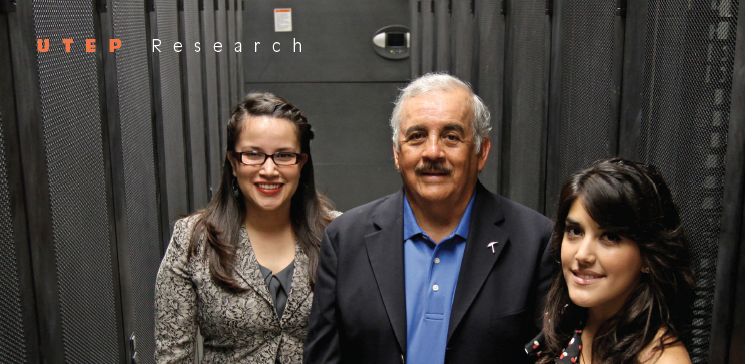Some of America’s most active, but seldom discussed, battlefields are electric power grids that control power for health care, business transactions, education, transportation, the military and so much more. According to the National Nuclear Security Administration, the United States sustains more than 10 million cyber attacks per day on nuclear reactor facilities, and that estimate could be conservative. The electric power industry receives a similar number of attacks per day.
A team of faculty, staff and students at The University of Texas at El Paso’s Regional Cyber and Energy Security (RCES) Center is working to create processes, products, services and methods to secure energy systems and infrastructure against cyber attacks by natural threats (tornadoes, lightning, hurricanes, and earthquakes); internal threats, such as disgruntled employees or employee mistakes; and equipment failures.

The team’s focus is primarily the protection of the Southwest region’s energy infrastructure, but their work is also expected to benefit governments and foreign and domestic enterprises. The RCES Center addresses both cyber security, which concerns IT communications and SCADA attacks –— computer systems that monitor and control industrial and infrastructure processes like manufacturing, water treatment and electrical power transmission -— and on energy security, which concerns cyber-physical security and resiliency in electric power grids. Due to the region’s abundance of solar energy, the RCES Center also concentrates on cyber and energy security for distributed solar photovoltaic systems.
The RCES Center was created in February 2012 with the help of a six-year, $3.4 million grant from the City of El Paso. It is a standalone center at UTEP that reports to the Office of Research and Sponsored Projects. The city sees the RCES Center as an economic development engine that can create high-tech job opportunities for Southwestern area graduates.
Ralph Martinez, Ph.D., RCES director and the George W. Edwards, Jr./El Paso Electric distinguished professor in the College of Engineering, said the center’s goals are to improve cyber and energy security for electric power grids. He referred to El Paso’s three-day freeze in February 2011 that led to rolling blackouts as an example of how a drastic loss of access to energy can disrupt the region’s quality of life.
“Without the proper protection, system failure could create havoc in a community, when you think of all the medical, business, manufacturing, and education sectors that require power to operate,” Martinez said. “A significant national disruption could endanger the population and cost billions of dollars.”
Since its inception, the RCES Center has averaged a dozen inquiries per month from nations and agencies that want to collaborate with or use the center’s techniques and technologies.
“We’re swamped,” said Martinez, who also serves as the University’s Director of Energy Initiatives. He pointed to a white board on a wall in his Burges Hall office that showed a three-tiered list of supporters and collaborators, big and small. The RCES Center has signed one-year contracts with nearby Fort Bliss and White Sands Missile Range for modeling and simulation of their electric power grids and has proposed similar investments from the U.S. departments of Energy and Defense.
The RCES Center is also working with the IBM Smart Cities Program, Cisco Systems’ Cyber Security for Electric Grids, and the Electric Power Research Institute (EPRI). One of the bigger projects for which the RCES Center is competing is a five-year, $13.7 million award from the U.S. Agency for International Development (USAID) to design and deploy a clean energy infrastructure with cyber security features in Vietnam. The UTEP team would study how to improve the country’s legacy power infrastructure with solar, wind and natural gas options. USAID is expected to make its decision for an award in October 2012.
Industry heavyweights such as IBM and Cisco Systems Inc. have voiced their admiration and support of the RCES Center’s work. Barbara Walker, a Cisco key account manager who handles the El Paso area, said the unrest in northern Mexico and the growth of narcotics trafficking creates a compelling need for increased cyber and energy security in the Paso del Norte region.
“The added complexities of the multi-jurisdictional federal, state and international agencies that serve our region are increasingly dependent on secure communications infrastructure,” said Walker, who earned her bachelor’s degree in accounting from UTEP in 1981. “Together with RCES, our vision is aligned to provide solutions to those industries that rely on mission critical communication infrastructure to extend services. We value the strategic partnership and opportunities that we have working with RCES.”
The center also trains today’s students for what is expected to become an international multibillion-dollar industry.
“UTEP is one of the few universities to start such a program with a focus on cyber and energy security,” Martinez said.
The center employs 14, including seven graduate research assistants from the UTEP College of Engineering’s departments of computer science; industrial, manufacturing and systems engineering; and electrical and computer engineering. The number could grow to 85 by 2017 as the amount of work increases, Martinez said
Martinez recruited El Paso native Theresa Provencio for the team because of her creative and technical abilities. She is a master’s student in systems engineering at UTEP and earned a bachelor’s in graphic design from St. Edward’s University in Austin, Texas. Provencio said she loves to come to work because she is starting on the ground floor of a growing industry.
Provencio called RCES work “pioneering” because it sets the framework for other graduate students.
“I feel as if I’m in the right place at the right time,” she said. “The hands-on training I have received here is more than I could have asked for. I don’t think I’m going to struggle when it comes time to find a job.”
In the next few years, the center plans to advance its efforts to assess and monitor risk, develop test and certification methodology, and provide training to sustain cyber and energy security systems through products and services provided by partners and collaborators.